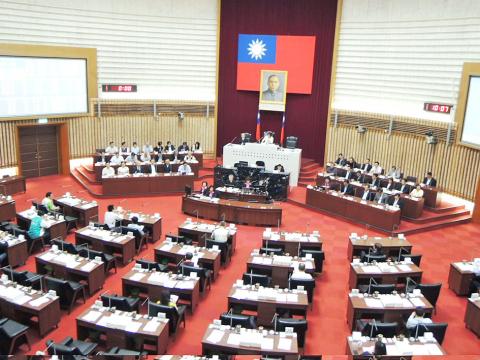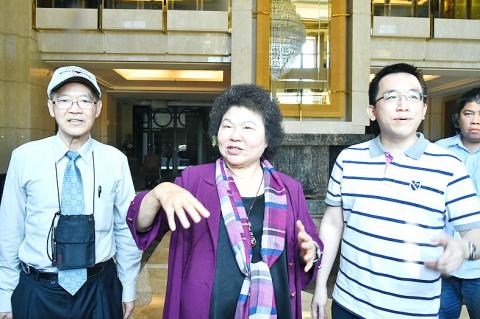The Presidential Office has rejected a renewed call from local governments to pardon former president Chen Shui-bian (陳水扁), saying there are still ongoing criminal cases involving Chen.
“Presidential pardon is an issue that will only be considered after a final verdict has been reached. However, a number of criminal cases against Chen are still going on,” the Presidential Office said in a statement released yesterday.
The office issued the statement shortly after the Kaohsiung City Council passed a motion proposed by the council’s Democratic Progressive Party (DPP) caucus urging President Ma Ying-jeou (馬英九) to grant a pardon to Chen before his term ends on May 20, which it said could facilitate rapprochement between the pan-blue and pan-green camps.

Photo Wang Jung-hsiang, Taipei Times
The motion was signed by 39 city councilors, four of whom are not members of the DPP.
Kaohsiung City Council Speaker Kang Yu-cheng (康裕成) of the DPP said the motion is a catalyst for “blue-green reconciliation.”
The Tainan City Council passed a similar motion proposed by two independent and two DPP city councilors on Wednesday last week, which garnered the support of 34 of the 56 participating city councilors.

Photo: Chang Chung-i, Taipei Times
On Monday last week, the Foundation of Medical Professionals Alliance in Taiwan also called for a presidential pardon for Chen, saying that the former president’s illnesses, including sleep apnea, suspected Parkinson’s disease and osteoporosis, could put his life at risk.
Speaking on the sidelines of a Kaohsiung City Council meeting yesterday, Kaohsiung Mayor Chen Chu (陳菊), a DPP member, said she approved of the motion, calling on Ma to make an effort to assuage Taiwan’s political confrontations and break through the blue-green divide.
“I believe the motion submitted by the DPP caucus urging Ma to pardon Chen Shui-bian can help achieve social harmony... Ma’s willingness to handle the matter as a president will be extremely conducive to Taiwan’s development,” Chen Chu said.
Later yesterday, Chen Chu and former minister of health Lee Ming-liang (李明亮) accompanied vice president-elect Chen Chien-jen (陳建仁) on a visit to Chen Shui-bian in Kaohsiung, where the former president is living.
Chen Shui-bian, who was in office from 2000 to 2008, has served more than six years of a 20-year prison term for several convictions on corruption charges.
Medical parole granted to the former president has been extended five times since he was first granted compassionate release in January last year. The former president’s health is re-evaluated every three months, with his sixth parole set to expire on May 4.
Meanwhile, Chen Shui-bian’s son, Chen Chih-chung (陳致中), yesterday posted a message on Facebook, thanking the public, the medical alliance and the Tainan and Kaohsiung city councils for showing concern for his father’s health.
“Restoring my father’s health, reputation and freedom is always on the minds of my grandmother and my other relatives,” Chen Chih-chung said.
Additional reporting by Tsai Wen-chu and CNA.

Right-wing political scientist Laura Fernandez on Sunday won Costa Rica’s presidential election by a landslide, after promising to crack down on rising violence linked to the cocaine trade. Fernandez’s nearest rival, economist Alvaro Ramos, conceded defeat as results showed the ruling party far exceeding the threshold of 40 percent needed to avoid a runoff. With 94 percent of polling stations counted, the political heir of outgoing Costa Rican President Rodrigo Chaves had captured 48.3 percent of the vote compared with Ramos’ 33.4 percent, the Supreme Electoral Tribunal said. As soon as the first results were announced, members of Fernandez’s Sovereign People’s Party

MORE RESPONSIBILITY: Draftees would be expected to fight alongside professional soldiers, likely requiring the transformation of some training brigades into combat units The armed forces are to start incorporating new conscripts into combined arms brigades this year to enhance combat readiness, the Executive Yuan’s latest policy report said. The new policy would affect Taiwanese men entering the military for their compulsory service, which was extended to one year under reforms by then-president Tsai Ing-wen (蔡英文) in 2022. The conscripts would be trained to operate machine guns, uncrewed aerial vehicles, anti-tank guided missile launchers and Stinger air defense systems, the report said, adding that the basic training would be lengthened to eight weeks. After basic training, conscripts would be sorted into infantry battalions that would take

GROWING AMBITIONS: The scale and tempo of the operations show that the Strait has become the core theater for China to expand its security interests, the report said Chinese military aircraft incursions around Taiwan have surged nearly 15-fold over the past five years, according to a report released yesterday by the Democratic Progressive Party’s (DPP) Department of China Affairs. Sorties in the Taiwan Strait were previously irregular, totaling 380 in 2020, but have since evolved into routine operations, the report showed. “This demonstrates that the Taiwan Strait has become both the starting point and testing ground for Beijing’s expansionist ambitions,” it said. Driven by military expansionism, China is systematically pursuing actions aimed at altering the regional “status quo,” the department said, adding that Taiwan represents the most critical link in China’s

EMERGING FIELDS: The Chinese president said that the two countries would explore cooperation in green technology, the digital economy and artificial intelligence Chinese President Xi Jinping (習近平) yesterday called for an “equal and orderly multipolar world” in the face of “unilateral bullying,” in an apparent jab at the US. Xi was speaking during talks in Beijing with Uruguayan President Yamandu Orsi, the first South American leader to visit China since US special forces captured then-Venezuelan president Nicolas Maduro last month — an operation that Beijing condemned as a violation of sovereignty. Orsi follows a slew of leaders to have visited China seeking to boost ties with the world’s second-largest economy to hedge against US President Donald Trump’s increasingly unpredictable administration. “The international situation is fraught